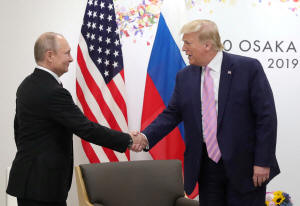US intelligence report alleging Russia election interference shared with
100 countries
 Send a link to a friend
Send a link to a friend
 [October 21, 2023]
By Jonathan Landay and Simon Lewis [October 21, 2023]
By Jonathan Landay and Simon Lewis
WASHINGTON (Reuters) - The United States on Friday released a U.S.
intelligence assessment sent to more than 100 countries that found
Moscow is using spies, social media and Russian state-run media to erode
public faith in the integrity of democratic elections worldwide.
"This is a global phenomenon," said the assessment. "Our information
indicates that senior Russian government officials, including the
Kremlin, see value in this type of influence operation and perceive it
to be effective."
A senior State Department official, briefing reporters on condition of
anonymity, said that Russia was encouraged to intensify its election
influence operations by its success in amplifying disinformation about
the 2020 U.S. election and the COVID-19 pandemic.
"Success breeds more, and we definitely see the U.S. elections as a
catalyst," the official said.
The Russian embassy did not immediately respond to a request for
comment. The release of the assessment comes amid serious tensions
between the United States and Russia over Moscow's war against Ukraine
and a raft of other issues.

The assessment was sent in a State Department cable dated Wednesday to
more than 100 U.S. embassies in the Americas, Europe, Asia and Africa
for distribution to their host governments, he said.
Washington was privately briefing recipient governments and shared the
assessment "to get ahead of elections that are over the horizon over the
next year," the official said.
The report represents Washington's latest move to combat what it says
are Moscow's efforts "to sow instability" in democratic countries by
portraying elections as "dysfunctional, and resulting governments as
illegitimate."
Washington "recognizes its own vulnerability to this threat," said the
report, noting that U.S. intelligence agencies found that "Russian
actors spread and amplified information to undermine public confidence
in the U.S. 2020 election."
U.S. President Joe Biden, a Democrat, in 2020 beat his Republican
predecessor, Donald Trump, who refuses to accept the results, falsely
claiming that he lost due to fraud.
[to top of second column]
|

Russia's President Vladimir Putin shakes hands with U.S. President
Donald Trump during a meeting on the sidelines of the G20 summit in
Osaka, Japan June 28, 2019. Sputnik/Mikhail Klimentyev/Kremlin via
REUTERS

Concerted Russian operations between 2020 and 2022 sought to
"undermine public confidence in at least 11 elections across nine
democracies, including the United States," the report said, adding
17 others were targeted by "less pronounced" efforts.
It did not identify any of the other countries.
Russia "utilizes both overt and covert mechanisms, including
influence networks and proxies managed" by Russian spy services, the
report said.
As an example, it continued, Russia's FSB security service secretly
worked to intimidate election workers, organize election day
protests and "sabotage overseas voting" in an unnamed European
country's 2020 election.
Russian state media openly claimed polls would be undemocratic and
"amplified false claims of fraud" in advance of multiple elections
in Asia, Europe, the Middle East and South America between 2020 and
2021, it said.
Russia also used social media platforms and "proxy websites" to sow
doubts about the integrity of elections, it said.
It called Russia "the leading culprit" conducting operations to
undermine public faith in the conduct and results of elections.
While China has interfered in elections, it was not assessed to be
using that tactic, the official said. China denies interfering in
elections.
The report recommended that countries work to mitigate Russian
election interference through sanctions, information sharing,
expulsions of Russian spies and travel bans.
(Writing by Jonathan Landay, Editing by Nick Zieminski)
[© 2023 Thomson Reuters. All rights
reserved.]This material
may not be published, broadcast, rewritten or redistributed.
Thompson Reuters is solely responsible for this content.
 |